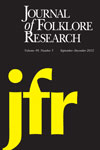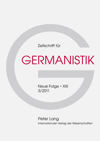
OSTERREICHISCHE ZEITSCHRIFT FUR VOLKSKUNDE
metrics 2024
Exploring the Depths of Cultural Heritage
Introduction
OSTERREICHISCHE ZEITSCHRIFT FUR VOLKSKUNDE is a dedicated academic journal published by the VEREIN FUR VOLKSKUNDE that focuses on the interdisciplinary study of folklore and ethnology, particularly in the Austrian context. With a long-standing history of contributing to cultural studies, this journal serves as an essential resource for researchers, professionals, and students interested in the nuances of social practices, traditions, and cultural narratives. Although it has ceased its indexing in Scopus as of 2019, its impact is reflected in its rankings, particularly in the categories of Social Sciences and Arts and Humanities, making it a crucial reference point for those studying cultural phenomena. The journal, with ISSN 0029-9669, is based in Vienna, Austria, and offers a rich compendium of articles that promote scholarly discourse and broaden understanding in the field of Volkskunde. As it continues to foster academic dialogue, OSTERREICHISCHE ZEITSCHRIFT FUR VOLKSKUNDE remains a notable contributor to the evolution of cultural studies in the region and beyond.
Metrics 2024
 -
- 0.10
0.10 0.10
0.10 -
-Metrics History
Rank 2024
Scopus
JCI (Web Of Science)
Quartile History
Similar Journals

JOURNAL OF FOLKLORE RESEARCH
Exploring the Rich Tapestry of Human NarrativesJOURNAL OF FOLKLORE RESEARCH, published by Indiana University Press, serves as a vital platform for scholarly exploration within the realms of folklore, cultural studies, and music. With an ISSN of 0737-7037 and an E-ISSN of 1543-0413, this journal has converged its content from 2002 to 2024, facilitating a dynamic discourse on the interplay of traditional narratives and contemporary cultural forms. Despite its current tier in the Q4 category for both Cultural Studies and Music, the journal is increasingly recognized for its contributions, ranking 69th in Music and 526th in Cultural Studies as per the latest Scopus metrics. Researchers, professionals, and students alike will find this journal an essential resource, rich with insights that traverse the complexities of human expression and societal narratives. Although not an open-access journal, the valuable research contained within its pages is crucial for advancing knowledge in folklore scholarship and its related disciplines.

Vestnik Permskogo Universiteta-Istoriya-Perm University Herald-History
Exploring the Depths of History and CultureVestnik Permskogo Universiteta-Istoriya (Perm University Herald-History), published by Perm State National Research University, serves as a pivotal academic platform for scholars in the fields of History, Archaeology, and Cultural Studies. With an ISSN of 2219-3111 and an impressive trajectory of convergence from 2019 to 2024, this journal has secured a commendable Q1 ranking in History and is recognized in the Q2 quartile across multiple relevant categories, demonstrating its significance in the scholarly landscape. Despite the absence of an open access model, the journal remains highly impactful and continues to contribute richly to the discourse surrounding historical and cultural research within the Russian Federation and beyond. The journal publishes original research, reviews, and theoretical papers, making it essential reading for those engaged in historical studies and related fields.

Zeitschrift fur Katalanistik
Pioneering Research in Linguistics and LiteratureZeitschrift für Katalanistik is a distinguished academic journal published by Albert Ludwig University in Germany, catering to the fields of Linguistics and Literature. With an impressive converged history from 2010 to 2023, this journal operates under rigorous academic scrutiny, as evidenced by its classification in the Q3 quartile for Linguistics and Q2 for Literature and Literary Theory. It holds a respectable ranking in the Scopus database, indicating its solid contribution to ongoing scholarly dialogue, particularly in the realms of both language and literary studies. Despite not currently offering Open Access options, the journal provides a vital platform for researchers, professionals, and students seeking to publish and explore contemporary issues in Katalan studies. With its comprehensive scope and academic rigor, Zeitschrift für Katalanistik remains an essential resource for anyone passionate about the intersection of Catalan language and literature.

FABULA
Pioneering Research in Cultural Studies and LiteratureFABULA is a distinguished academic journal published by WALTER DE GRUYTER GMBH, focused on the fields of Cultural Studies and Literature and Literary Theory. Since its inception in 1958, FABULA has contributed significantly to the discourse surrounding narrative theory, literary analysis, and cultural criticism, positioning itself as a vital platform for innovative research. With a Q2 ranking in Literature and Literary Theory and a Q3 ranking in Cultural Studies for 2023, the journal demonstrates its commitment to high-quality scholarship while fostering interdisciplinary dialogue among researchers and professionals. Although it currently does not offer Open Access options, its rigorous selection process ensures that published works meet the highest academic standards. Located in Berlin, Germany, FABULA remains a crucial resource for scholars seeking to deepen their understanding of the complexities inherent in narrative forms and their cultural implications, supporting ongoing research endeavors from 1964 through 2024.

Rusin
Connecting Scholars Through Interdisciplinary ScholarshipRusin is a distinguished academic journal published by ASSOC RUS in Moldova, playing a pivotal role in the multidisciplinary landscape of the humanities and social sciences. With an ISSN of 1857-2685 and an E-ISSN of 2345-1149, this journal has been circulating since 2011, amassing a significant reputation by 2023 as evidenced by its prestigious quartile rankings: Q2 in Anthropology, Q1 in History, Q2 in Linguistics and Language, Q1 in Literature and Literary Theory, and Q3 in Sociology and Political Science. The journal boasts remarkable Scopus rankings, including an impressive rank of #145 in Literature and Literary Theory, placing it in the 86th percentile among its peers. Although currently not open access, Rusin serves as an essential platform for researchers, professionals, and students, aiming to further the understanding of complex cultural and historical narratives, language evolution, and sociopolitical dynamics. As an informative resource, it fosters critical dialogue and interdisciplinary collaboration, solidifying its importance in the publishing realm within the humanities and social sciences.

ZEITSCHRIFT FUR GERMANISTIK
Advancing Scholarly Discourse in Germanic StudiesZEITSCHRIFT FUR GERMANISTIK, published by PETER LANG GMBH, is a distinguished academic journal that serves as a vital resource in the fields of German studies, literature, linguistics, and cultural analysis. With an ISSN of 0323-7982, this journal provides critical insights and promotes scholarly discourse surrounding the evolving landscapes of German language and literature. Although it operates under a traditional access model, readers and researchers benefit from its rigorous peer-reviewed articles that span decades of intellectual inquiry. Historically featured in Scopus, the journal is noted for its impactful contributions, ranking 244th in Literature and Literary Theory and 406th in Linguistics and Language, highlighting its importance in the academic community. Situated in Bern, Switzerland, ZEITSCHRIFT FUR GERMANISTIK not only caters to scholars seeking to enrich their understanding of Germanic studies but also aims to bridge gaps across interdisciplinary borders, fostering a deeper appreciation of the cultural narratives that shape our world.

FOLKLORE
Bridging Disciplines through Folklore StudiesFOLKLORE is a distinguished academic journal published by Routledge Journals, Taylor & Francis Ltd, concentrating on the rich tapestry of cultural expressions across time and context. With its ISSN 0015-587X and E-ISSN 1469-8315, this esteemed journal has been pivotal in the fields of Anthropology, Cultural Studies, and History, holding an impactful legacy since its inception in 1890. Currently ranking in the Q2 category in both Cultural Studies and History and Q3 in Anthropology, FOLKLORE is recognized for its significant contributions to the understanding of cultural phenomena and practices. Researchers and scholars will find this journal an invaluable resource, as it explores the intricate nuances of folklore, myth, and tradition with rigor and depth, catering to an audience keen on the interdisciplinary intersections of societal discourse. Although it is not an Open Access journal, it continues to foster critical discussions and extensive research on folklore, making it a vital platform for academic advancement in the humanities and social sciences.

Vestnik Slavianskikh Kultur-Bulletin of Slavic Cultures-Scientific and Informational Journal
Unveiling the Rich Tapestry of Slavic CulturesVestnik Slavianskikh Kultur-Bulletin of Slavic Cultures is a distinguished scientific and informational journal published by the State Academy of Slavic Culture. This journal, with ISSN 2073-9567, plays a pivotal role in the field of Slavic studies, providing a platform for the dissemination of cutting-edge research, cultural discourse, and scholarly analysis pertaining to Slavic cultures and civilizations. The journal aims to foster a deeper understanding of Slavic heritage, literature, and the societal dynamics shaping these cultures today. Although currently lacking an open access model, it remains an important resource for researchers, professionals, and students interested in the rich tapestry of Slavic traditions and contemporary cultural phenomena. With its thoughtful curation of articles, Vestnik Slavianskikh Kultur is poised to contribute significantly to ongoing scholarly conversations within the humanities.

Lares-Quadrimestrale di Studi Demoetnoantropologici
Fostering Insight into the Intersections of Culture and SocietyLares-Quadrimestrale di Studi Demoetnoantropologici is a prominent scholarly journal dedicated to the fields of demoethnoanthropology, exploring the intersections of cultural practices, traditions, and social dynamics. Published by CASA EDITRICE LEO S OLSCHKI, this esteemed journal provides an academic platform for researchers and practitioners to disseminate original research findings and critical reviews, delving into ethnographic studies and community-based inquiries. With an ISSN of 0023-8503 and an E-ISSN of 2036-511X, Lares is recognized for its commitment to scholarly excellence and its contribution to advancing knowledge within its field. Although it currently categorizes as non-open access, the journal remains highly regarded among academics, ensuring the widespread dissemination of significant research. The journal's base in beautiful Florence, Italy, enhances its cultural richness and appeal, making it a notable reference point for scholars dedicated to the study of human cultures and social systems.

Acta Baltico-Slavica
Exploring the Rich Tapestry of Slavic ScholarshipActa Baltico-Slavica, an esteemed academic journal published by the Polish Academy of Sciences, Institute of Slavic Studies, serves as a vital platform for the exploration of Slavic cultures, languages, and historical narratives. Since its transition to Open Access in 2014, the journal has fostered inclusivity and accessibility, allowing researchers, professionals, and students to engage with cutting-edge scholarship in the fields of History, Linguistics and Language, and Literature and Literary Theory. With a commendable impact as indicated by its category quartile rankings (Q2 in History and Literature, Q3 in Linguistics), and Scopus rankings reflecting its significance within the academic community, Acta Baltico-Slavica not only contributes to the rich tapestry of scholarship surrounding the Baltic and Slavic regions but also encourages interdisciplinary dialogue. The journal’s commitment to advancing knowledge across its fields of study makes it a prominent destination for scholarly discourse and research inquiry.